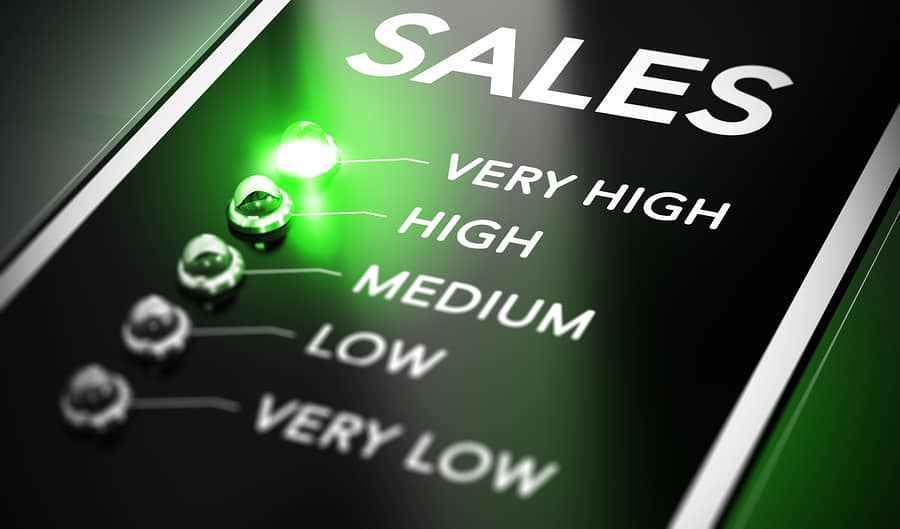“What Do You Stand For?”
Knowing the answer to this question can energize your life and your business for the rest of your days.
It can be the difference between success and failure…
Last week, an inspirational quote image scrolled through my Facebook newsfeed. My good friend Cathy Demers had shared it.
 I read it and thought, “That’s pretty profound!” And then I saw the attribution.
I read it and thought, “That’s pretty profound!” And then I saw the attribution.
It was something that I had said during my interview with her. It was my quote:
“The ultimate product you create is…yourself!”
I probably heard that somewhere else, I’m sure. Who knows?
But I started thinking about that. It’s really very true. If we’re not creating our best self, we leave our best product on the shelf.
Of course though, it’s the hardest job we can have, and with the least tangible ROI, so…
We focus on strategies and tactics until we work ourselves into a quivering frenzy of activity, adrenaline rushing through our veins until we squeeze out the last nickel from our latest email promotion.
That same stimulant keeps our brains buzzing through the night as we stare wide-eyed at the ceiling pondering the next big promotion. What’s it going to be?
Like Sisyphus, we’re pushing that rock uphill, only to get to the top and wonder why?
(Don’t know Sisyphus? In Greek mythology, he was the king of Ephyra and was punished for his ‘self-aggrandizing craftiness and deceitfulness’ by being forced to roll an enormous boulder up a hill only to have it roll back down every time – for all of eternity!)
Self-aggrandizing. Self-absorbed. Selfish.
There’s a funny thing that happens though
As we begin making more money, and achieve more success, a hole in our stomach gets bigger and bigger, and we can’t quite fill it with the normal activities.

Money, work, big promotions – none of that seems to gets the juices going any longer.
And it’s because we are a little bit lost.
If you haven’t experienced this yet, you probably will at some point, especially as you begin adding the years.
It may show up as the blahs… nothing is really wrong, but there’s nothing really right either.
We begin questioning why we’re doing what we’re doing. And everything else too!
About this time, other people begin questioning our motives too.
That’s because we’ve lost our connection.
In my middle years, I saw something astounding in myself after a few well-deserved personal calamities:
Whenever I began feeling too important, a fall was just around the corner. Always.
 The symptom that preceded the debacle was judgement, judging everything and everyone.
The symptom that preceded the debacle was judgement, judging everything and everyone.
The problem with judgement is that it separates me from everyone, the people I love and the people who rely on me in my business.
People get hurt.
When that happens, I have to mash the brakes, come to a dead stop, and regroup.
The best way to do that is to reach back and ask myself, “What do I stand for?”
With that question, I’m touching the reactor core. I’m getting at the heart of the matter. I’m relieving the pressure and getting some much needed perspective on how I’m really doing.
With the perspective comes less stress, better blood flow, and calmer physical and mental systems.
But most importantly, my ego gets a good dose of rightsizing.
You see, that’s where the trouble is. Our ego wants to protect us. Staying safe usually means that we don’t make big changes. We don’t jeopardize the existing system, so it wants us to keep doing what we’ve been doing, even if it’s wrong.
Essentially, we can’t trust the ego.
The ego doesn’t care two cents what you stand for! The ego stands for itself, nothing else. Until we take charge of the little voice holding us back, we never progress. We give up. We fail – without learning. We cave into fear.
Remember earlier when I mentioned the least tangible ROI?
 The return on investment (in yourself) is slow going. And it may even seem like a waste of time because it’s a lot of work doing self-discovery. And it’s not for the faint of heart.
The return on investment (in yourself) is slow going. And it may even seem like a waste of time because it’s a lot of work doing self-discovery. And it’s not for the faint of heart.
But there are business benefits galore that come from answering the question: What do you stand for?
First, we need to make an assumption. And that is that you’re building a long-term, community-based group of prospects and buyers that you actually want to turn into evangelists for your brand. You like these people and you want to hang out with them.
That single goal implies that you want people who will identify with you, your expertise and your beliefs. In other words, they are more like you than not, or at least can identify with some of your beliefs.
With the assumption that you’re building a long-term business community, two things are really important:
- Identifying, targeting, and engaging with your ideal client. Often, we speak of building your customer avatar as the key to building a community that buys your products and enjoys knowing you. This is where the LIKE part of “Know, Like and Trust” becomes especially important.
- Sharing points of view. Shared attitudes, shared beliefs, shared goals – all of this comes from the person running the community. Without the commitment to transparency and actually building bonds with community members, the community will flounder along.
This sounds very risky…
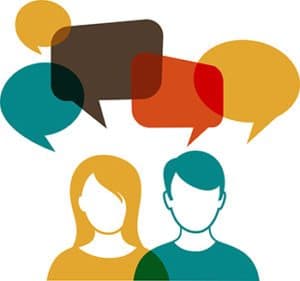 It is. The risk is that you’re going to offend someone. And of course, you will. In fact, you must.
It is. The risk is that you’re going to offend someone. And of course, you will. In fact, you must.
We don’t mean to offend anyone intentionally, but by answering the question, “What do you stand for?”, you can’t help but alienate some people who have completely opposite beliefs.
That doesn’t mean it has to be unfriendly or unpleasant. In fact, evidence from the 2016 U.S. election to the contrary, people can have robust discussions about difficult topics and still be friends.
And with that, often comes a lot of respect.
But the people who become your evangelists, your best partners, buyers and promoters, are those who LIKE you the most.
If they don’t know you, they can’t like you.
There’s a quote by Ernest Holmes, a New Thought leader from the 20’s through the 70’s who did a speech in 1959, that has always rung true to me:
“Find me one person who is for something and against nothing, who is redeemed enough not to condemn others out of the burden of his soul, and I will find another savior, another Jesus, and an exalted human being.”
For something and against nothing…
Wow, now that’s a really amazing concept. I said earlier that judgement is the beginning of my downfall, so I’m obviously not there, but I certainly try to come at everything from the “for something” viewpoint.
Often, it’s just a difficult perspective shift.
“Being for something and against nothing” indicates that you’re willing to bring a solution to the table instead of pounding on the problem.
When I ran projects for a major telecom, I had a rule: Don’t bring me the problem until you have a solution.
So, here I am! What do I stand for?
First, I have strong beliefs about politics and religion. Neither of those really define who I am and why I do what I do though. They’re just opinions. Everybody’s got opinions.
Nothing makes my opinions better than your opinions. If you want to persuade me that your opinion is better than mine, come armed with facts that can’t be disputed.
What I stand for is more than an opinion. It’s a guideline. A rule. These are things I believe that guide my life.
Your job is to figure out what you stand for, claim it, and voice it. Don’t be shy. Hiding your light under a bushel as the old proverb says is doing nobody any good.
Here we go. I stand for:
Hope
 Hope is the driving force behind everything, I think, but you have to understand what hope is and what it is not.
Hope is the driving force behind everything, I think, but you have to understand what hope is and what it is not.
Often, people will poo-poo someone who talks about hope with comments like, “Hope is not a business plan.” That’s true, but if you don’t have any hope to begin with, the business plan never gets off the ground.
Hope is not a substitute for action. I can hope for a peanut butter and jelly sandwich, but unless I get up, get the ingredients, and spread it on bread, it’s going to be hope misplaced.
We live in a society of personal responsibility. We’re all accountable for our progress. Hope is the first step. It’s the dream. Dream becomes reality only through action.
Love in my life
 I’m not talking about lust or sometimes-when-I-get-what-I-want kind of love, but the kind of love that never goes away and puts a smile on your face every time you think of that person.
I’m not talking about lust or sometimes-when-I-get-what-I-want kind of love, but the kind of love that never goes away and puts a smile on your face every time you think of that person.
It’s not the kind of love that has strings attached. But it’s also not unconditional. There are boundaries.
My wife and I have discussed those boundaries and set them in stone. If one violates the boundaries, the relationship is in jeopardy, and trust is broken.
And we have the commitment to work at the love within the boundaries. Together.
Family
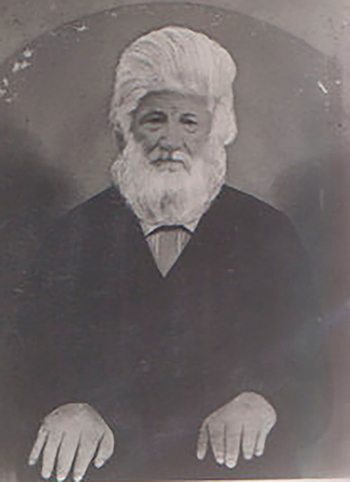
Kids, parents, aunts and uncles – what a pain in the rear… But what a great joy too.
I was a great dad when my kids were very young. Then, as I became too important, I turned into a terrible dad. And now, I hope I’m a much better dad because of that experience.
It’s the same with my parents: Not such a great son, but now much better. My perspective has changed and so has my commitment to them.
Family, to me, is THE Legacy. When I’m gone, they will still be here. Today, we leave behind video, pictures and writings. People doing genealogy research in 100 years will have the benefit of looking through the Facebook archive. Oh my!
What will they see?
Having gotten involved heavily in my own family history all the way back to 1500 in England, I’m discovering the legacies others have left me include the good and the bad. Now, it’s another opportunity for me to evaluate who I want to be.
Simplicity
 This is extremely hard for me.
This is extremely hard for me.
I’m a problem solver. But I’m also part Rube Goldberg – look it up. I can build a mousetrap that is so complicated people have no idea that a mouse was ever involved.
The hardest part of my daily life is to keep it as simple as possible so I can do the most good with the resources at hand.
Keeping life simple improves all aspects of the other things I stand for. But occasionally, I like to just jump in and stir it up a bit too – bit of a chaos junkie I’ve been told.
Money
I like money. I like having money. I like giving money away. I like everything about money.
 My belief is that money is nothing but energy in paper form. It’s a tool that allows us to impact the world. I don’t expect that I’ll die with a lot of money because I love to live. And as long as I can walk and breath, there’s a lot to do, many people to help, and great causes doing great work.
My belief is that money is nothing but energy in paper form. It’s a tool that allows us to impact the world. I don’t expect that I’ll die with a lot of money because I love to live. And as long as I can walk and breath, there’s a lot to do, many people to help, and great causes doing great work.
Money helps with all that.
And let’s face it, life is just so much easier when you don’t have to worry about money.
The management of money is a completely different animal. Everyone needs training in creating and managing money and not letting it manage you.
Travel
 When I was a kid, my family loaded up the big station wagon, strapped on the car top carrier stuffed to the gills with traveling stuff, and headed cross country.
When I was a kid, my family loaded up the big station wagon, strapped on the car top carrier stuffed to the gills with traveling stuff, and headed cross country.
We went to the Grand Canyon, Washington D.C., and Florida among others.
When I was 15, my parents scraped enough cash together to send me on a 21-day, 9-country European school tour. It was life-changing and began my love of other cultures.
From there, I ventured to China, Peru, Ethiopia and many others. Third-world travel became my favorite thing to do. Whenever I came home from a great trip, two things happened:
- I was truly grateful for being a U.S. citizen
- I understood people in another culture a little better only to discover that they were very much like me with pretty similar goals in life
Travel is the great doorway that allows us to embrace other cultures we don’t understand.
Business
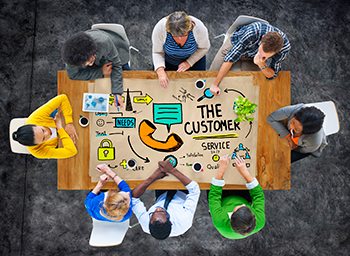 This is pretty obvious, but I believe in business. But maybe not for the reason you would suspect.
This is pretty obvious, but I believe in business. But maybe not for the reason you would suspect.
You see, I think business is a diplomatic tool and can be used to bring peace. One thing I learned from world travel is that everyone has a business, whether it’s selling goods in the weekly market in China, having a small coffee stand in a rural Ethiopian village, or renting your burro for transportation in the Peruvian mountains.
Business drives the world.
When people do commerce with each other, they’re friendlier and more understanding. And when everyone can feed their families, the tension in the world is reduced.
And business is incredibly creative. Since it’s all about problem solving, there’s a new challenge every day.
The solutions can be as imaginative as the customers will allow.
Oneness
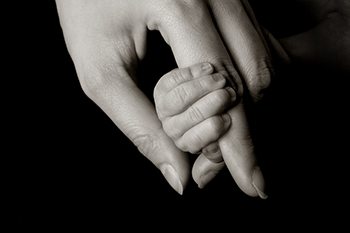 I started to say “environment”. Then, I thought I should include “spirituality”. And I really thought “respect” deserved to be on this list, since that can be the basis of all relationships.
I started to say “environment”. Then, I thought I should include “spirituality”. And I really thought “respect” deserved to be on this list, since that can be the basis of all relationships.
But when I looked more closely, the word that comes up is “Oneness”. In fact, it seems like a common thread throughout this piece.
We are one. When we’re not one, we’re in conflict. It’s as simple as that.
Being one with the environment means respect for land, nature, animals and the earth. It means respecting ourselves and our descendants enough to be great stewards of the world around us.
We don’t over fish, over hunt, over drill, over pollute, or anything else that could be too extreme unless we want it all to be “over”!
Being one with our community means that we are a part of, not a part from. It’s about contributing and pitching in. That can be anything from being a volunteer fireman to serving (or just supporting) the school’s parent/teacher organization to serving on the city council to picking up the trash on the road. (And hopefully, helping others see that throwing trash on the road is hurtful to all.)
Being “One With” is committing 100 percent to the group.
Start with a small group – maybe your family – and soon we realize we’re all part of a much bigger group that covers the planet.
Service
 And it finally comes down to this.
And it finally comes down to this.
I stand for service – helping others in the best way possible. I can always listen and be a friend in my small groups, but even in the larger groups like my online communities, we can help in any way possible and reasonable.
We’re here to serve.
Now, it’s your turn.
Hopefully, when you’re building your business, you’re focusing on what you stand for and bringing your special skills to those who want to be your evangelist. Start by sharing what you stand for and attracting those like-minded people as soon as possible.
Come over to the MyNAMS Facebook page and comment on this blog post to tell us what you stand for?
It’s okay. They won’t bite.
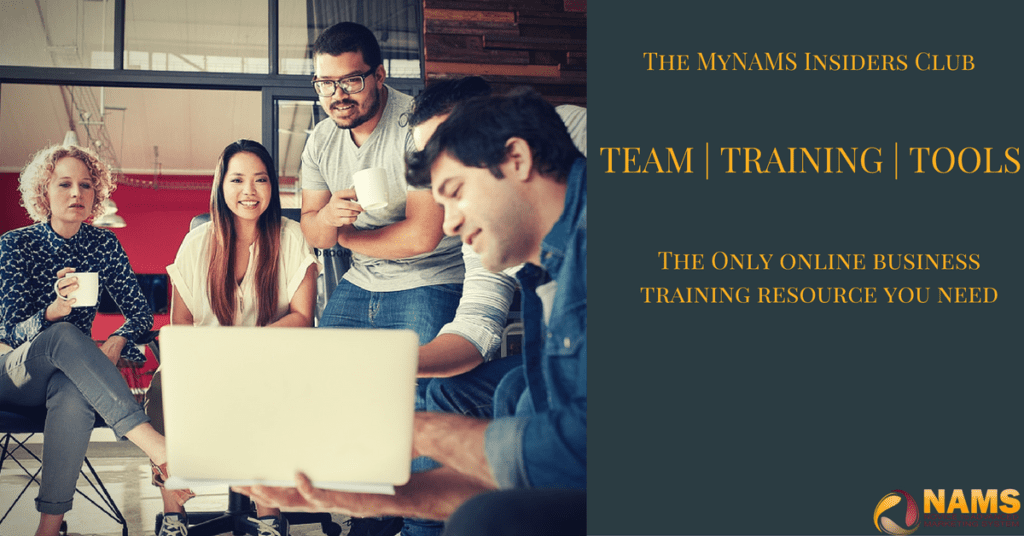
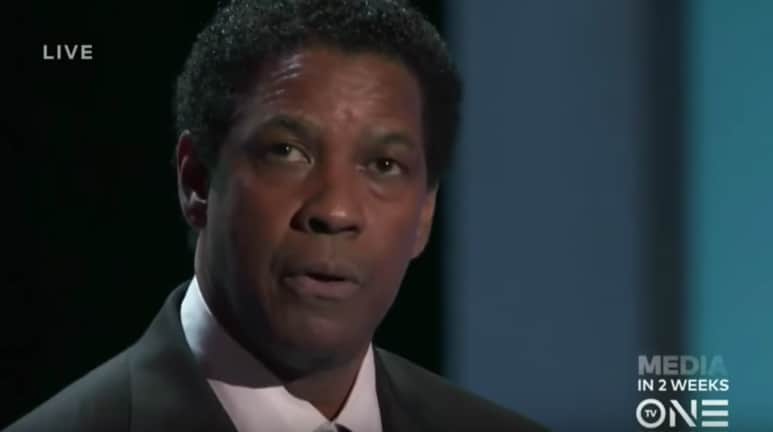


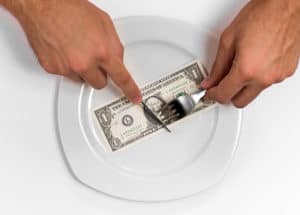 Dropping a thousand or more on programs and coaches was not an option for me. I didn’t have the mindset for that.
Dropping a thousand or more on programs and coaches was not an option for me. I didn’t have the mindset for that.
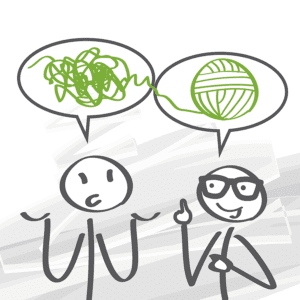 And he had this uncanny knack of answering my very specific question with a high-level diagram or handout that tied to an Alexism (parable) that helped me discover the problem as it fit into the whole of my business.
And he had this uncanny knack of answering my very specific question with a high-level diagram or handout that tied to an Alexism (parable) that helped me discover the problem as it fit into the whole of my business. She should be able to help me flatten the learning curve. Of course, I have to know what I want before I approach the coach. If I hire someone who is a great product creation coach, but I’m looking for information about creating automated Facebook Ad campaigns, then it’s not a fit - at that time.I would work with five of my six coaches again in a heartbeat if I need help in their particular areas of expertise. But the last thing I want to do is pay someone to learn what I’m learning. They need to have a high level of experience in their expertise.One coach actually fired me because she said, “You have a million dollar business; you need a million dollar coach. I’m not a million dollar coach. Now, go find that coach to go to the next level.”That’s a coach who knows her value and her expertise, and is confident enough to work within her comfort zone. I refer dozens of people to her.
She should be able to help me flatten the learning curve. Of course, I have to know what I want before I approach the coach. If I hire someone who is a great product creation coach, but I’m looking for information about creating automated Facebook Ad campaigns, then it’s not a fit - at that time.I would work with five of my six coaches again in a heartbeat if I need help in their particular areas of expertise. But the last thing I want to do is pay someone to learn what I’m learning. They need to have a high level of experience in their expertise.One coach actually fired me because she said, “You have a million dollar business; you need a million dollar coach. I’m not a million dollar coach. Now, go find that coach to go to the next level.”That’s a coach who knows her value and her expertise, and is confident enough to work within her comfort zone. I refer dozens of people to her.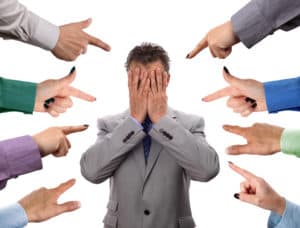 Actually, that question should be what happens WHEN you get stuck because we all do.
Actually, that question should be what happens WHEN you get stuck because we all do.